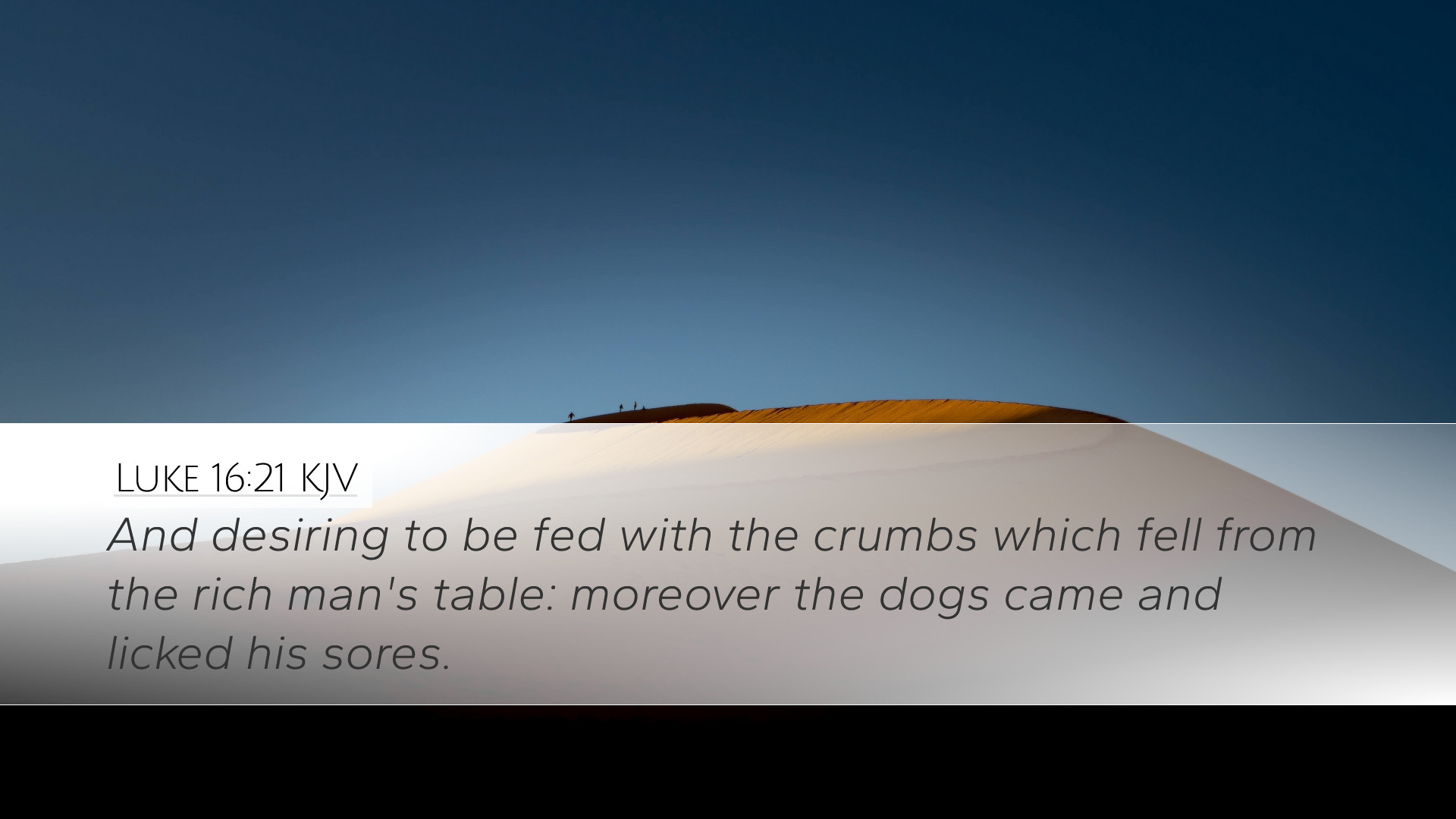Commentary on Luke 16:21
Bible Verse: Luke 16:21 - "And desiring to be fed with the crumbs which fell from the rich man's table: moreover the dogs came and licked his sores." (KJV)
Introduction
This passage is an integral part of the parable of the rich man and Lazarus. It powerfully illustrates the stark contrast between wealth and poverty, as well as the themes of desire, suffering, and divine justice. The insights gleaned from public domain commentaries, including those of Matthew Henry, Albert Barnes, and Adam Clarke, provide a rich tapestry of understanding that can deepen our appreciation for this scripture.
Contextual Analysis
Understanding Luke 16:21 necessitates examining its context within the parable. The rich man, who lives in luxury, stands in sharp contrast to Lazarus, a beggar. Their lives, though intertwined in this earthly realm, diverge greatly in their conditions. The mention of the dogs licking Lazarus's sores epitomizes his abject poverty and suffering.
Matthew Henry's Insights
- Desire and Humiliation: Henry emphasizes Lazarus's intense desire for the crumbs from the rich man's table. This desire indicates his dire need yet underscores his lowly status, reflecting a spiritual yearning that transcends physical hunger.
- The Dogs as Companions: The presence of the dogs serves a dual purpose. While they highlight Lazarus's misery, they also become a sort of solace for him in his suffering, licking his sores. This can be interpreted as a symbol of uncleanliness and rejection by society.
- Contrast of Lives: The rich man's indifference towards Lazarus encapsulates a profound moral lesson. Henry notes that wealth can blind individuals to the suffering of others and emphasizes the importance of compassion and empathy.
Albert Barnes' Perspective
- Symbolic Meaning of Crumbs: Barnes elucidates that the "crumbs" represent the scantest form of sustenance, underscoring Lazarus's desperation. This small wish illustrates not only physical hunger but also a longing for dignity.
- Dogs' Licking: He notes that the act of dogs licking Lazarus's sores demonstrates both neglect by human society and a sense of divine presence in the form of unexpected companionship in suffering.
- Alert to Moral Implications: Barnes warns that the rich man's neglect of Lazarus serves as a cautionary tale for those who might find themselves in positions of privilege, reminding them of their moral obligations toward the less fortunate.
Adam Clarke's Commentary
- Examination of Desire: Clarke focuses on the nature of Lazarus's desire. He suggests that it reveals the extent of Lazarus's suffering - a craving not for wealth, but for mere survival, offering a poignant critique of societal values.
- Interpretation of Suffering: Clarke discusses how the physical ailments represented by the sores indicate a deeper spiritual significance. Lazarus’s plight showcases the fallen state of humanity and the need for divine intervention and salvation.
- Comparison and Afterlife Perspective: Clarke highlights the importance of understanding this parable within the context of the afterlife, where the roles of the rich man and Lazarus are dramatically reversed, serving as a profound statement on divine justice.
Theological Implications
The verse compels a reflection on the ethical responsibilities of those who are affluent towards those in poverty. The theological implications are vast, resonating with themes of social justice, divine retribution, and the need for compassion.
Application for Christian Living
Pastoral application stemming from Luke 16:21 can focus on several key points:
- Awareness of Suffering: Congregations are encouraged to foster awareness of societal suffering and act responsibly towards the disenfranchised.
- Cultivation of Compassion: Followers of Christ are called to cultivate a heart of compassion, reflecting Christ's love in tangible ways to the marginalized.
- Examination of Values: This passage urges individuals to examine what they value and how that aligns with Christ's teachings on wealth, humility, and service.
Conclusion
Luke 16:21 serves as a profound reminder of the disparities that exist in our world. The insights from Matthew Henry, Albert Barnes, and Adam Clarke collectively emphasize the significance of awareness and action in response to societal need. The church must not only proclaim the gospel but also demonstrate it through acts of love, mercy, and justice.
As we meditate on Lazarus's plight and the rich man's indifference, may we be inspired to live lives marked by compassion, willing to share sustenance—both spiritual and physical—amidst a broken world.


